
Alfred Elton van Vogt was a Canadian-born American science fiction author. His fragmented, bizarre narrative style influenced later science fiction writers, notably Philip K. Dick. He was one of the most popular and influential practitioners of science fiction in the mid-twentieth century, the genre's so-called Golden Age, and one of the most complex. The Science Fiction Writers of America named him their 14th Grand Master in 1995.
"Misfit" is a science fiction short story by American writer Robert A. Heinlein. It was originally titled "Cosmic Construction Corps" before being renamed by the editor John W. Campbell and published in the November 1939 issue of Astounding Science Fiction. "Misfit" was Heinlein's second published story. One of the earliest of Heinlein's Future History stories, it was later included in the collections Revolt in 2100 and The Past Through Tomorrow.

Orphans of the Sky is a science fiction novel by American writer Robert A. Heinlein, consisting of two parts: "Universe" and its sequel, "Common Sense". The two novellas were first published together in book form in 1963. "Universe" was also published separately in 1951 as a 10¢ Dell paperback. The work presents one of the earliest fictional depictions of a generation ship.
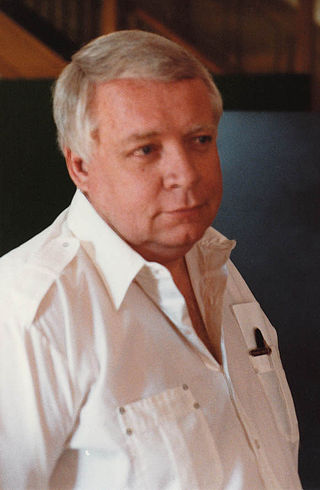
Algirdas Jonas "Algis" Budrys was a Lithuanian-American science fiction author, editor, and critic. He was also known under the pen names Frank Mason, Alger Rome, John A. Sentry, William Scarff, and Paul Janvier. He is known for the influential 1960 novel Rogue Moon.

Michael Swanwick is an American fantasy and science fiction author who began publishing in the early 1980s.
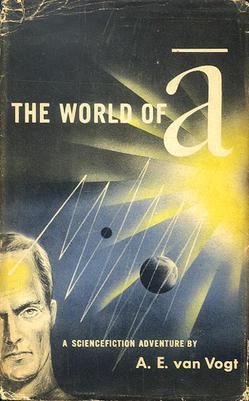
The World of Null-A, sometimes written The World of Ā, is a 1948 science fiction novel by Canadian-American writer A. E. van Vogt. It was originally published as a three-part serial in 1945 in Astounding Stories. It incorporates concepts from the General Semantics of Alfred Korzybski. The name Ā refers to non-Aristotelian logic.
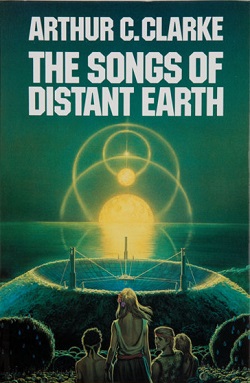
The Songs of Distant Earth is a 1986 science fiction novel by British writer Arthur C. Clarke, based upon his 1958 short story of the same title. He stated that it was his favourite of all his novels. Clarke also wrote a short step outline with the same title, published in Omni magazine and anthologized in The Sentinel in 1983.

Inconstant Moon is a science fiction short story collection by American author Larry Niven that was published in 1973. "Inconstant Moon" is also a 1971 short story that is included in the collection. The title refers to "O, swear not by the moon, th' inconstant moon", a quote from the balcony scene in William Shakespeare's Romeo and Juliet. The collection was assembled from the US collections The Shape of Space and All the Myriad Ways.
"The Exiles" is a science fiction short story by Ray Bradbury. It was originally published as "The Mad Wizards of Mars" in Maclean's on September 15, 1949 and was reprinted, in revised form, the following year by The Magazine of Fantasy & Science Fiction. First collected in The Illustrated Man (1951), it was later included in the collections R Is for Rocket (1962), Bradbury Stories: 100 of His Most Celebrated Tales (2003), A Sound of Thunder and Other Stories (2005) and A Pleasure to Burn.
The science fiction writer Robert A. Heinlein (1907–1988) was productive during a writing career that spanned the last 49 years of his life; the Robert A. Heinlein bibliography includes 32 novels, 59 short stories and 16 collections published during his life. Four films, two TV series, several episodes of a radio series, at least two songs and a board game derive more or less directly from his work. He wrote a screenplay for one of the films. Heinlein edited an anthology of other writers' science fiction short stories.

The End of the Matter (1977) is a science fiction novel by American writer Alan Dean Foster. The book is fourth chronologically in the Pip and Flinx series.

Revolt on Alpha C is a juvenile science fiction novel by American writer Robert Silverberg, published by Crowell in 1955. It was Silverberg's first published book.
A fix-up is a novel created from several short fiction stories that may or may not have been initially related or previously published. The stories may be edited for consistency, and sometimes new connecting material, such as a frame story or other interstitial narration, is written for the new work. The term was coined by the science fiction writer A. E. van Vogt, who published several fix-ups of his own, including The Voyage of the Space Beagle, but the practice exists outside of science fiction. The use of the term in science fiction criticism was popularised by the first (1979) edition of The Encyclopedia of Science Fiction, edited by Peter Nicholls, which credited van Vogt with the creation of the term. The name “fix-up” comes from the changes that the author needs to make in the original texts, to make them fit together as though they were a novel. Foreshadowing of events from the later stories may be jammed into an early chapter of the fix-up, and character development may be interleaved throughout the book. Contradictions and inconsistencies between episodes are usually worked out.
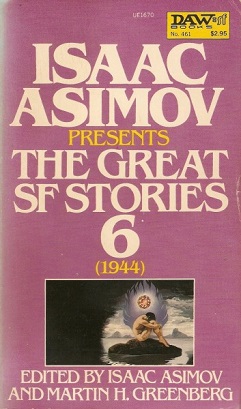
Isaac Asimov Presents The Great SF Stories 6 (1944) is the sixth volume of Isaac Asimov Presents The Great SF Stories, which is a series of short story collections, edited by Isaac Asimov and Martin H. Greenberg, which attempts to list the great science fiction stories from the Golden Age of Science Fiction. They date the Golden Age as beginning in 1939 and lasting until 1963. The book was later reprinted as the second half of Isaac Asimov Presents The Golden Years of Science Fiction, Third Series with the first half being Isaac Asimov Presents The Great SF Stories 5 (1943). This volume was originally published by DAW books in December 1981.
The following is a list of works by Arthur C. Clarke.
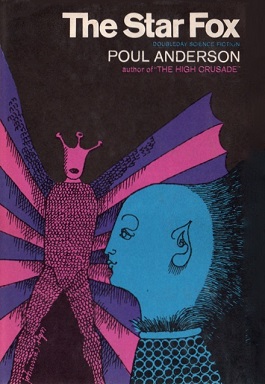
The Star Fox is a science fiction novel by Poul Anderson, first published in 1965. It was nominated for the Nebula Award for Best Novel in 1965.

Quest for the Future is a science fiction novel by Canadian-American writer A. E. van Vogt. It was first published by Ace Books in 1970.

Great Stories of Space Travel is an anthology of science fiction short stories edited by Groff Conklin. It was first published in paperback by Tempo Books in July 1963, and reprinted by the same publisher in December 1965, 1969, and April 1970.
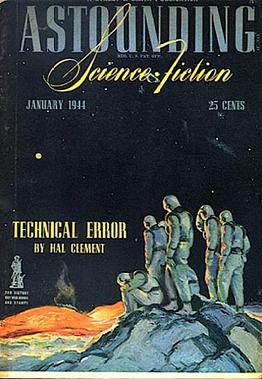
Far Centaurus is a science fiction short story by Canadian-American writer A. E. van Vogt, first published in Astounding Science Fiction in 1944. Writer and critic P. Schuyler Miller called it "unforgettable and unforgotten."
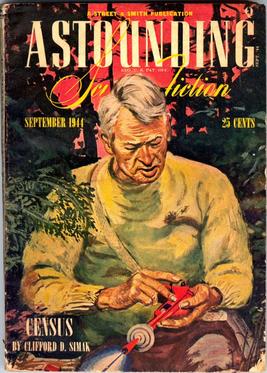
A Can of Paint is a science fiction short story by Canadian-American writer A. E. van Vogt, originally published in Astounding in 1944. It is a light-hearted look at the first crewed mission to Venus, a "science puzzle" or "problem story" that requires the protagonist to think his way out of a thorny situation. Included in several anthologies, it was also made into a short film in 2004.














